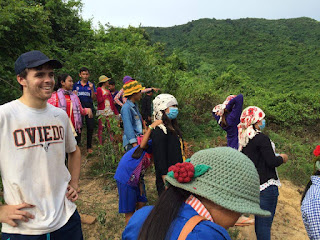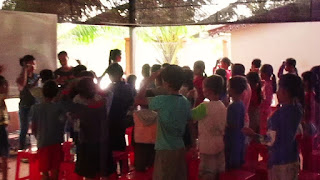Monthly Archives: July 2016
A Better Country
 Hello everyone,
Hello everyone,
Things have been a bit crazy here for the last couple of weeks (hence no blog posts), but here’s a little bit about what’s been going on:
I mentioned the discipleship/vocation program in my last post. Two
students in Angk’jeay, who will hopefully be going to Phnom Penh to study in a few months, are currently taking a gap year from school. Their names are Ouchea and Srey Sros. Right now, the goal for them is to be as well-prepared as possible for the challenges of transitioning from village life to college-in-the-city life. One common obstacle for villagers that prevents a healthy transition is a lack of the ability to use basic computer software.
Thus, for the past couple of weeks I have been helping them continue to learn the ropes of Microsoft Word (they’ve been studying with Sokha for many months now). Needless to say, columns are the bane of my existence, but I would like to personally thank Bill Gates for Ctrl+Z. If you don’t know why that is, try doing one of Ouchea and Srey Sros’s assignments – imitating a US Department of Justice Immigration and Naturalization form in Microsoft Word. It was a party. Even in spite of some very hard assignments, Srey Sros and Ouchea learn very quickly and they have been an absolute pleasure to teach.
Luke took a bunch of the students and me to a local mountain on Sunday! Here’s some pictures:


Yesterday, Samuth, the pastoral intern, and I met for the last time to practice English pronunciation. We’ve been meeting three times a week to go over some basic phrases for teaching and family life in hopes of building confidence in his English skills. He has noticeably improved even in the short time that I’ve been here and I am sure that he will continue to do so. Samuth helps with the classes here at the Smith’s, but he hopes to start a similar ministry in another village sometime in the future.
I have three full days left in Cambodia. In all honesty, that is a wildly foreign thought. Am I really going to take off on a plane, spend 30 hours in travel, and just like that be on the exact opposite side of the world again? Will I actually be going back to life as it is in the US? In many ways, it’s been hard to adjust to life and habits here (and I’m still very far from being “well-adjusted” if such a thing is possible), but now it all has become so normal. I expect to wake up with a beautiful village sunrise, a couple English and guitar classes scheduled for the day, and the faces of my new Cambodian friends. I expect that I’m going to have to ask some fourth graders how to pronounce the Khmer word for “color” for the fifteenth time. I presume that my day will end in basketball, worship, and prayer. The pace of life here markedly contrasts much about American life; there is structured time for rest that virtually doesn’t exist in the US, especially in college. I will certainly miss Cambodia very much.
This is not to say that I don’t miss home. I’m excited to reunite with family and friends (… and certain kinds of food). But nonetheless, I am sad to be uprooted again – to be thrown into another season of changing and adjusting. However, this summer has served as a beautiful reminder of the transience of life. Christians are not called to be comfortable. This world is extremely broken by sin; we are called to live in that brokenness, to hold our own comfort and interests with open hands, and to place our hope in a future when the brokenness will be no more.
“But as it is, they desire a better country, that is, a heavenly one. Therefore God is not ashamed to be called their God for he has prepared for them a city.” – Hebrews 11:16
I am longing for a better country, for the time when there will be no more adjustment – when the comfort and peace of God replaces all anxiety and uncertainty. I would greatly covet your prayers during this transition, and I thank you for all of your prayers and support thus far. They are very precious to me.
In Christ,
Caleb
Eternal Life in Christ Church Student Testimonies
Get me to the church on time. I may need a few alarms.
Hey, this is Caleb again, the Summer intern. Here’s my latest blog post!
Can you imagine a world in which church starts at 6:30am? Certainly not! Who would speak of such things? Cambodians would. Why, you ask? Cambodia is hot; and after 10am, the list of things that you want to do in a buttoned-down shirt and khakis is composed of exactly nothing. Not everyone has such an early tea time, as it’s only the younger kids who roll up for Sunday School at half ’til seven (on their bikes). Nonetheless, the regular worship service is usually underway by 8:00am and no one is a bit upset about it. I’m not. I promise. Quit looking at me like I’m trying to convince myself. Waking. up. early. is. easy.
Now, let’s talk about Sundays. First up, Sunday School; the only justifiable time for the use of flannelgraphs. Unfortunately, flannel doesn’t hold up great in unyielding humidity and heat, so we have to settle for whiteboards here in Southeast Asia.
Sunday School begins with a decent bit of socializing/playing for the students, which includes some games and activities organized by secondary school students. I often play along, but indiscriminately break most of the rules, because, as is the case with most things in my life, I’m only pretending that I actually understand what’s happening. After game time, everyone grabs a seat and begins to sing songs with some sweet hand motions (I also participate in befuddlement).
The next part of Sunday School, the Bible lesson, is my favorite, but I have to give a bit of a backstory to explain why that is. Luke and Sokha have been in the village for about five years now, teaching English and Bible classes the entire time. Thus, some of their students have graduated from secondary school. But what do they do afterwards? Well, that is where the discipleship/vocation program comes in. The Smith’s have arranged this program in collaboration with MTW to assist students, who are demonstrably committed to the ministry here and capable of attending college, to pay for their post-secondary education expenses. Students from the ministry then have the chance to attend college in Phnom Penh with hopes of getting jobs that will allow them to support their families, churches, and communities.
Following the Bible story, older students and adults make their way to the front of the Smith’s home for a time of group worship. The morning is filled with Khmer hymns, liturgical readings, and a sermon, which for the last number of weeks has been given by the church’s Cambodian pastoral intern, Samuth.
Samuth became a Christian as a young man in a similar ministry to the one being done here in Angk’jeay. He eventually attended Bible school, where he met his wife Kunthea, and decided to pursue pastoral ministry. The lives of Cambodian pastors are not easy to say the least. It is hardly a position that is respected in the social sphere as 95% of the nation is Buddhist, and congregations rarely have the means to give pastors anything near a reasonable wage. Bear in mind that an average Cambodian household income sits somewhere around $200 a month (substantially less in the villages). If you would like to read more about what MTW is doing to sustainably support pastors like Samuth, please click here.
All that being said, it’s hard to imagine that I only have a bit over three weeks remaining in the village; time feels like it has flown. I can only imagine that the rest of the time will go just as quickly. Please be praying that I use this time diligently and passionately. Once again, thank you so much for your prayers and support; I could not be here without them.
In Christ,
Caleb
Village Sustainability Project
Sustainability Project, which provided Samuth seed money to purchase cows. The income he generates raising cattle would provide for his family, while honoring both his past experience, and his local context, where he is eminently more relatable raising cattle – as others in his village are apt to do – than solely ministering while receiving foreign funds.

